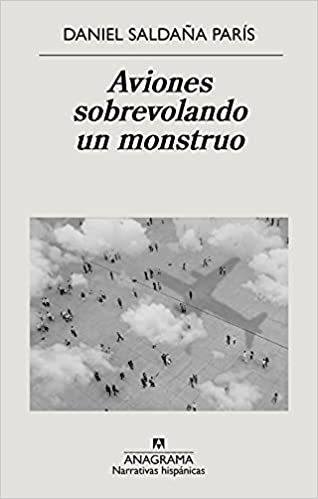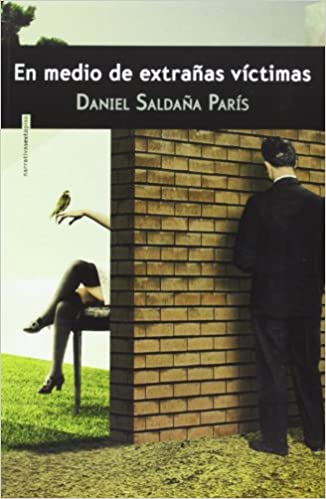The daring, exploration and nakedness of the soul always make avant-garde literature. Something that Daniel Saldana He preaches with the ease of someone who is fully convinced of his mission in this world. And only the convinced writer can end up reaching new ways of projecting literature with language. Everything else is projections, too, but of Chinese shadows, when the important thing is to transmit light, new words and concepts far from the general gloom of literature.
To begin with, a different writer has to confuse, intermingle like a trilero of words, jump from genre to genre, from biographical to essayistic or turn towards the lyrical. But nothing to separate. Everything goes in the same book to end up composing novels of changed foot, true plots that slide meanderingly to one side or the other of reality. The result is a kaleidoscopic lucidity where everything is color, even the worst shadows of the grayest days.
Top 3 recommended books by Daniel Saldaña Paris
The dance and the fire
Reunions can be as bitter as vain second chances in love. Old friendships strive to recover a space that no longer exists to do things that no longer belong. Not for anything in particular, only because deep down they do not satisfy, but simply seek impossible reparations.
The dance can end in fire when you try to fuel your passions at the wrong time and end up jumping from that bonfire of vanities that gets bigger and bigger with the years. A great novel by Daniel Saldaña with that fascinating point of the telluric when one plots in his land with a parallel depth between the land of the lost homeland and the soul.
After years without seeing each other, in Cuernavaca three friends who met in adolescence intersect: Natalia, Erre and Conejo. The trio's reunion brings out the past and confronts them with their present: friendship and desire, the distant discovery of sexuality, complex father-child relationships, the stress of maturing and trying to find a place in life, the aspirations that they stay by the way, the creativity that seeks to express itself ...
In the background, two obsessive presences announced in the title: the fires that ravage the area until the air is unbreathable and cause a feeling of enclosure and uncertainty, and the dance. The dance is a choreography prepared by Natalia, it is the mythical Hexentanz –the witch's dance– by the expressionist dancer Mary Wigman, it is the witch dances and the strange dance epidemics of the Middle Ages, which may now be repeated in Cuernavaca . The city under the Malcolm Lowry volcano, the city where Charles Mingus went to die and through which Hollywood stars of yesteryear walked, acquires, between reality and myth, a special prominence as an increasingly disturbing space from which perhaps it is best to leave while possible.
Daniel Saldaña Paris has written a powerful novel that shakes the reader and plunges him into a turbulent universe that will not leave anyone indifferent. This bold and ravishing book is yet another important step forward in the literary career of one of the most ambitious and talented contemporary Mexican writers.
Planes flying over a monster
There is something of Goya in this book full of fantasies erected as huge looming shadows, perhaps disconcerting muses, shadows grown from the intense bonfire of a constantly burning existence of their time. In the open sky, at night, the natural habitat of every soul in combustion of its inexhaustible youth, in search of those wild shadows that end up dancing to the sound of fire.
Halfway between the chronicle, the autobiography and the narrative, this is a book about cities, about lived experiences and about writing and literature. The common thread that sews these texts is the trip through cities that have been relevant in the author's life.
Thus, we witness his return to Mexico City - «the Monstrous City» - after a year of absence; We travel through the Cuernavaca of today and the already non-existent one that Malcolm Lowry drew in Under the volcano; We visited Havana, where the author's parents gave birth to him in a small hotel during a brief stay amid revolutionary fervors; We discovered a Montreal with a cloudy past and present in which at thirty degrees below zero there is a whole underworld.
We accompany him on a stay at a writers' residence in New Hampshire where the use of certain drugs ends up turning an American author into a succubus in the middle of the forest; We followed him to Madrid where - with Lieutenant Colonel Tejero as a neighbor - he organized a party with a piñata of viscera and other excesses under the auspices of Georges Bataille; or we browse through the books in your library that have accompanied you on your moves ... An intelligent, evocative and at times crazy and devilishly funny book. An author to keep track of.
Amid Strange Victims
The great new promise of Mexican letters stands out with a carefree and sly novel that will entertain and move readers. Rodrigo is a young bureaucrat who could easily belong to what Strindberg called "the old young man's club." His days go by without much fuss in a museum in Mexico City until Cecilia, the secretary who made his life miserable, slips him a note that simply says "I accept."
That afternoon Rodrigo will find out that someone has proposed to Cecilia on his behalf, and the inertia that governs his days leaves him no choice but to marry. From there, a sinister odyssey ensues in which he loses his job and spends the time spying on a chicken that roams the vacant lot next to his apartment.
In parallel, a Spanish academic and writer, Marcelo Valente, travels to a small community located in Mexico, called Los Girasoles, to spend a sabbatical researching Richard Foret, a mysterious writer, boxer and artist, who found in Mexico what he was looking for during his entire life: a tragic outcome "at the height of his megalomania."
Los Girasoles becomes a nerve center in which the lives of the characters find their destiny between "the most absurd accidents" and situations as esoteric as the hypnotic sessions - induced by ingesting the urine of a beautiful teenager - in which a group of adventurers will define "the future of art."
Laughter, defined by Slavoj Zizek as "the metastasis of jouissance", is the fundamental tool used in Daniel Saldaña Paris' first novel to expose that "hurtful scandal" that is civilization. With good humor but without concessions, the incomprehension that the characters feel before a world that constantly reminds them, not always in the most subtle ways, of their disabilities and their mediocrity, is exposed by the author with a prose that advances at a pace furious rocking throughout the entire Spanish language.



